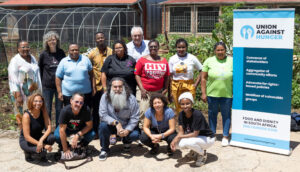
The Union Against Hunger is a coalition of forces from academia and civil society. Photo Alaister Russell/CoE-FS.
The recently launched Union Against Hunger (UAH), a collaboration of academia and civil society, was created out of a dire necessity to see hunger in South Africa finally acknowledged as a crisis. And for the collective of activists, scholars and organisations, acknowledgment is simply not enough; they want change.
On Wednesday 26 February 2025, UAH founding members, including the DSTI-NRF Centre of Excellence in Food Security (CoE-FS), met in Lorentzville, Johannesburg, for the official launch of the initiative.
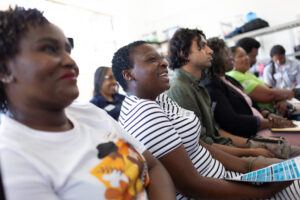
The UAH launch took place at the People’s Pantry in Lorentzville, Johannesburg. Photo Alaister Russell/CoE-FS.
Those addressing the launch came from across sectors and disciplines: researchers, government representatives, civil society activists and community members, all with shared goals — how do we convince South Africans to care about this cause? And how do we stop hunger? The first step, is understanding just how severe the issue of hunger really is.
‘Slow violence’
Hunger is not simply one of the bullet points that should be glossed over when one discusses the widely acknowledged issues in South Africa, such as homelessness, substance abuse or social injustice. It is, in fact, a standalone issue and a form of ‘slow violence’ that is perpetrated against South Africa’s most vulnerable citizens. One in four children in South Africa face food insecurity, and nine million children experience hunger daily.
This was highlighted by the three keynote presenters: Professor Stephen Devereux, Dr Edzani Mphaphuli (Grow Great Campaign) and Dr Linda Ncube-Nkomo (Nelson Mandela Children’s Fund (NMCF)).
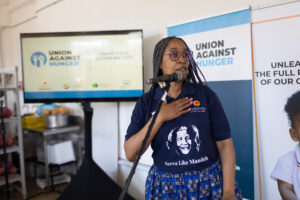
NMCF’s Dr Linda Ncube-Nkomo delivered a keynote presentation. Photo Alaister Russell/CoE-FS.
The first speaker was Professor Devereux, holder of the National Research Foundation (NRF) Research Chair in Social Protection for Food Security, affiliated with the CoE-FS at the University of the Western Cape.
Devereux set the tone for the day, both of excitement and relief to finally be tackling an issue many in the room had been raising the alarm about and dedicating their resources to for years.
“If you look at the relationship between food insecurity and race, you will see that almost a quarter of coloured and black South Africans are food insecure. And less than five percent of white and Asian citizens are plagued by this issue.
“This shows us that certain groups are more impacted than others,” noted Devereux, member of the UAH secretariat.
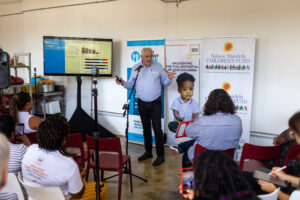
SARChI Chair holder and CoE-FS researcher Prof Stephen Devereux. Photo Alaister Russell/CoE-FS.
Worst affected on a provincial level are the Eastern Cape, KwaZulu-Natal and the North-West. However, the Western Cape stands out for the jarring gap between its secure and food-insecure citizens.
This gap, Devereux noted, is seen in how vineyards and the farming sector generate massive wealth but leave farmworkers as some of the most food insecure in the country; workers who, due to seasonal work, are left without jobs and sufficient food during the winter months. This, in turn, points to insufficient government grants and unemployment insurance, which do not do enough to feed seasonal workers, in amount or quality.
South Africa, robbed
So, why should the average citizen care? First, is that we are meant to be the country of ubuntu: “I am what I am because of who we all are”. Second, it’s the fact that all South Africans have a constitutional right to being fed. Despite this, there’s the very real issue of child stunting.
Child stunting is “a condition where a child’s growth is impaired due to poor nutrition, repeated illness and inadequate care”. 80% of all brain development occurs in the first two years of a child’s life. Malnutrition at these ages, including the nine months inside the womb, can lead to irreversible learning and development issues.
“That’s a life ruined before it even began,” said Dr Edzani Mphaphuli, executive director of Grow Great Campaign, and a UAH secretariat member.
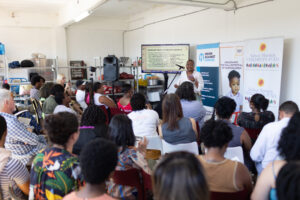
Grow Great’s Dr Edzani Mphaphuli delivered a keynote presentation. Photo Alaister Russell/CoE-FS.
And it is a population robbed of its future, considering that conservative Department of Health clinic figures indicate that more than 1 000 children die from malnutrition, annually, in the Eastern Cape alone.
Actionable change
How then, does the UAH intend on responding? Dr Busiso Moyo, CoE-FS postdoctoral fellow and UAH secretariat member, elaborated.
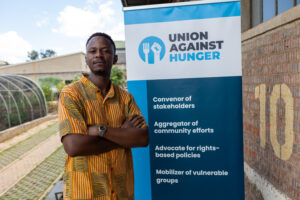
Dr Busiso Moyo is a CoE-FS postdoctoral fellow, and UAH secretariat member. Photo Alaister Russell/CoE-FS.
UAH is eager to “lean on the human rights heritage” of South Africa. The same way education, housing and the finance sectors have seen intervention and great changes being made in line with the socioeconomic rights codified in the Constitution, so too must hunger.
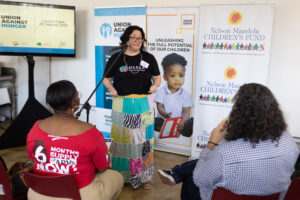
HEALA is one of the UAH’s founding member organisations. Photo Alaister Russell/CoE-FS.
UAH, with the input of its founding members — including the CoE-FS, the Nelson Mandela Children’s Fund, the Healthy Living Alliance, and the Grow Great Campaign — aim to help to bridge the gap between grassroots activists and government to create actionable change. This includes tackling nutritional education; demanding that government intervene to limit the food industry’s ability to set exclusionary prices; and, most importantly, giving expression to the “right to life”.
“Because as Nelson Mandela himself put it, ‘Freedom is meaningless if people cannot put food in their stomachs’,” said Dr Moyo.
Next steps
Rounding out the morning, community activists and grassroots organisers also took to the stage to deliver equally as impassioned speeches about the work they are doing, and are looking forward to doing, under the banner of UAH.
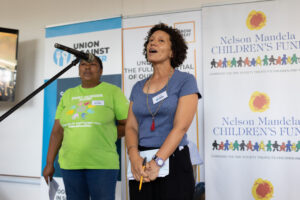
Dr Kara Mackay and Nicolene McGee of the Women on Farms Project. Photo Alaister Russell/CoE-FS.
Voicing their willingness to join forces on the ground, and to build truly national programmes aimed at ending hunger, were organisations such as the Women on Farms Project, and the Treatment Action Campaign.
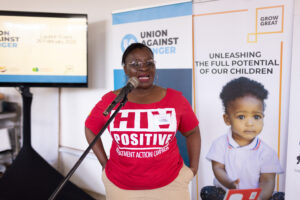
The Treatment Action Campaign delivered its message of support and solidarity. Photo Alaister Russell/CoE-FS.
As for immediate next steps, detailed by UAH secretariat member and veteran activist Mark Heywood, the UAH will host the first of many “Hunger Indabas”, with the launch scheduled to coincide with Freedom Month in April. They will meet to finalise a list of demands and an action plan, with the buy-in of all stakeholders.
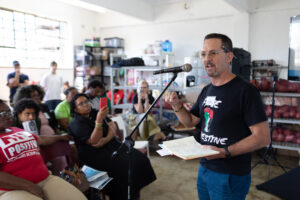
Mark Heywood details the next steps, including mobilisation toward World Hunger Day 2025. Photo Alaister Russell/CoE-FS.
Next, is World Hunger Day on 28 May 2025, the deadline UAH has given itself to begin demonstrations around the country, to mobilise support about the cause.
And it’s a cause that the UAH is committed to ensuring won’t be viewed as a charity movement of elite academics, preaching to those most affected; but, instead, as a mission to work hand-in-hand to eradicate hunger and end the shame associated with reaching out for much-needed assistance.
related Articles
SONA 2026: Coordinated strategy needed to deal with food and malnutrition crisis
Prof Stephen Devereux holds the SARChI Chair in Social Protection for Food Security , affiliated with the DSTI-NRF Centre of…
What would an anti-hunger budget have looked like?
Dr Busiso Moyo is a postdoctoral researcher with Union Against Hunger (UAH) founder-member, the DSTI-NRF Centre of Excellence in Food…
Black South Africans, in particular, face chronic and seasonal hunger
Prof Stephen Devereux is a Principal Investigator with the CoE-FS. Photo Icon Media Productions/CoE-FS. At the 5th International Social Justice…



